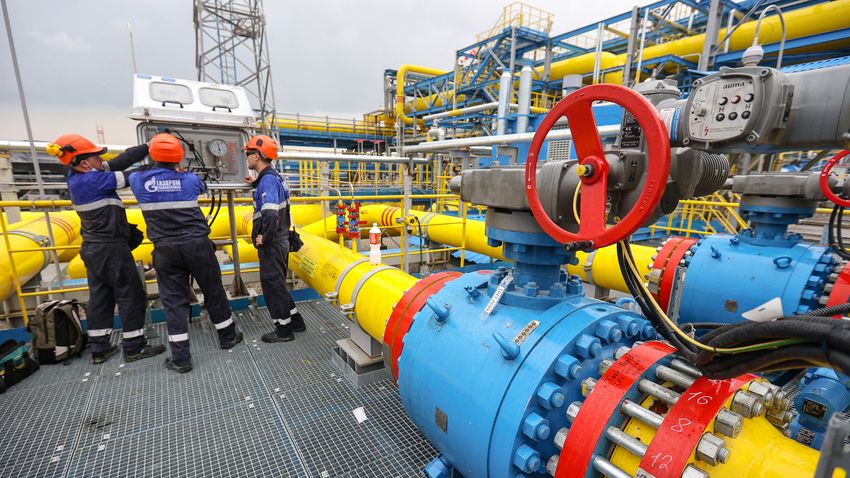The oil embargo is even good for Russia, as it freed it from its contractual obligations to supply cheap European oil, and now it can sell the same oil at significantly higher prices to India and China without any problems, says energy lawyer Máté Tóth in an interview with Mandiner.
Can the European Union legally impose tariffs on Russian oil, as it appears in the leaked plans of the European Commission?
The idea can only be formally legal, and the emphasis is now on the word "formal". But beyond formality, the idea also raises serious ethical and trust issues. In such a fundamentally defining issue as the oil embargo, the introduction of an import duty would undermine, empty, and even mock the compromise of the highest level of member states. This, if accepted, would have the effect that, at a lower level, avoiding unanimity, the EU would also smuggle back the embargo on pipeline oil deliveries: an import duty, making oil more expensive, would essentially make it impossible to import for which Brussels had granted an exemption a little earlier. I note that, knowing the nature of oil transport contracts from the point of view of transferability, the public externalities formed in the meantime, i.e. after the conclusion of the contract, i.e. customs charges, taxes and official measures, would probably end up with the buyer.
What does that mean?
That
the Russians would not suffer any harm from the import duty,
while for our country, as well as for the other countries that buy pipeline oil, even more so. In other words, with this idea, the EU only wants to harm us.
article about the idea .
However, with such a measure, by voiding the hard-earned compromise of the member states, which requires unanimity, the trust in the decision-making of the Union is shaken. It is precisely Brussels that likes to emphasize concerns about the rule of law in relation to member states with political leadership that is not sympathetic to it - in fact, such suggestions, which are already amazing as an idea, deepen serious concerns about the legality of the operation of the EU.
Has something similar happened in the past?
Unfortunately, this is not the first such step. Let's remember how the Poles were deceived after the negotiated conditional agreement to the so-called Green Agreement, but raised the same legality and legal security concerns when the authorities did not allow the legal Nord Stream 2 pipeline at the suggestion of the EU. Or how the EU "absorbed" member states' competences related to pipelines coming from third countries. Steps that raise such ethical and trust concerns quite simply inflate the reliability and predictability of joint decision-making, pushing the Union away from the basic idea of compromise in the direction of tyranny.
According to the current situation, how reliable is Russia as a partner of the Union in terms of the transport of energy carriers, and vice versa?
Since the beginning of the war, despite the constant threats from the EU, the Russians have fulfilled both oil and gas deliveries without interruption. The deliveries were smooth. Brussels, not Moscow, claims that it will "reduce" Russia's dependence on gas, regardless of the contractual terms, and it was not the Russians, but the EU that interrupted oil shipments by sea. And it was not the Russians, but the Ukrainians who threatened to block the Barátság crude oil pipeline, just as the only temporary gas pipeline block so far was done by the Ukrainians at Sohraniivka since the beginning of the war. Despite all reports to the contrary
the gas transport contracts were not canceled by the Russians either, but by the EU member states that refused to pay
- in unreliable press products, it is spread as fake news that the Russians have started demanding gas prices in rubles. Already five member states have not paid for the delivered natural gas, which is like eating the cocoa snail in the store without paying. With a fair sense of justice, we must say that it is not the Russians who have become an unreliable partner, but the EU, which no longer respects property rights unconditionally. The polemic about the state supervision of the Russian gas storage facilities in Germany is memorable, which probably qualifies as indirect expropriation at the level of international legal standards. Europe has become an unreliable contract partner, which does not bode well for international relations.
Do you see a chance to introduce the so-called gas embargo?
Sensing the ideology-driven nature of the EU, unfortunately, my answer is yes. However, this would have amazing consequences, especially when combined with the effect of the oil embargo that has already come into force. As is well known, Europe uses 41 percent of Russian gas, and this, among many other things, is directly needed for residential heating, electricity production, and chemical industry purposes (fertilizer production). According to authoritative American analyses, even with amazing efforts and extraordinary costs, the Union will not be able to replace more than a third of Russian oil imports by the end of the year. A gas embargo is therefore possible, but it would be a disastrous step. Of course, it depends on who: the citizens of Europe, since they would face serious price increases and security of supply risks. But America would do well, as it would finally find a market for its expensive, environmentally polluting liquefied natural gas.
What legal means do we have if the Russian or Ukrainian side were to block the pipelines?
In terms of international law, our positions are strong, because based on the Energy Charter Agreement, the transit pipeline simply cannot be closed, and this is a very serious obligation. I myself have participated in several international proceedings initiated on the basis of the charter in Washington, these obligations really have to be taken seriously and the acting arbitration court will enforce them. However, all this is only partially reassuring, since an international compensation sanction is the so-called follow-on sanction.
I mean?
We are not helped by being proven right years later. That is why Hungary very rightly requested that in the event of the pipelines being blocked, our supply from alternative sources should be ensured. The detailed rules for this have not yet been created, but in the case of oil - since the oil embargo has already been accepted - this should practically mean the possibility of our supply via the Adriatic pipeline starting from the island of Krk. Of course, we are best off if we do not wait for the EU, but we ourselves try to provide this so-called "back-up" supply through bilateral negotiations: this is exactly what Hungarian foreign policy is working with Croatia on.
From the point of view of international law, how well founded, prepared, and enforceable are the energy sanctions measures, and what retorts await those who violate them?
In a professional sense, the energy sanctions are by no means well-founded, since for political reasons such voices were specifically ignored, and professional, technocratic criticism was turned off.
Let's face it, the oil embargo is even good for Russia, as it freed it from its cheap European contract delivery obligations,
and now you can sell the same oil to India and China at a significantly higher price. However, the issue of implementation is even more exciting, which can only work in Europe, even for Europe, with strict monitoring. It is not enough for the ships to follow the delivery note, because the oil is mixed in ports, transhipped on the open sea, and brought to Europe through intermediary countries. Since the oil is refined in India, the "reborn" Russian oil can already arrive in Europe via the Suez Canal - filtering them out or not depends on the detailed implementation rules. However, the monitoring of actual, physical violations of energy sanctions practically rests with the national authorities of the member states at the customs borders.
Photo: Pavel Lvov/Sputnik via AFP












